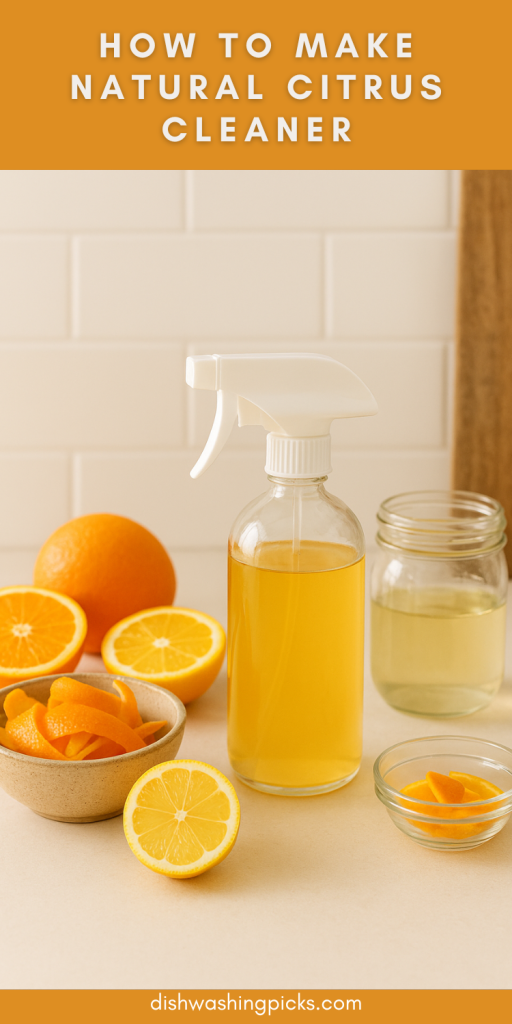
Okay, let’s be real for a second. Cleaning is not exactly the highlight of anyone’s day. But you know what makes it slightly less painful? When the thing you’re cleaning with smells like you just peeled a giant, juicy orange. That’s the magic of a citrus cleaner—it’s fresh, it’s zesty, and it secretly tricks your brain into thinking cleaning isn’t so bad after all.
And here’s the kicker: making your own citrus cleaner is ridiculously easy. Like, “why didn’t I do this sooner?” easy. Forget the overpriced bottles at the store with twenty unpronounceable ingredients. You can whip up a batch at home with stuff you probably already have sitting around in your kitchen.
Why Citrus?
Good question. What’s so special about oranges, lemons, or whatever other citrus fruit you’ve got lying around?
Well, first of all—citrus smells amazing. Walk into a room that smells like lemon or grapefruit and suddenly everything feels cleaner, even if you only wiped down one counter. But beyond the scent, citrus peels are naturally packed with oils that help cut through grease and grime. They’re like nature’s little degreasers.
So in short: it smells like sunshine and it actually works. Win-win.
What You’ll Need
Here’s the fun part—you don’t need a chemistry set or a fancy shopping trip. This recipe is super simple:
- Citrus peels (lemon, orange, lime, grapefruit—go wild, mix and match)
- White vinegar (the unsung hero of natural cleaning)
- A mason jar or glass container (big enough to hold your peels)
- A spray bottle (glass if you have it, because oils and plastic don’t always get along)
- Water (preferably distilled, but tap works too)
That’s literally it. If you’ve got fruit, you’ve already got half the ingredients.
How to Make It
Alright, let’s get into the “cooking” part—though this is more of a set-it-and-forget-it situation.
- Eat your fruit. Yep, step one is the best step. Snack on that orange or squeeze that lemon into your tea. Just don’t toss the peels.
- Toss the peels into your jar until it’s about half full.
- Pour in white vinegar until the peels are completely covered.
- Close the jar and let it sit in a dark cupboard for about two weeks. (Yes, this is the “patience required” part.)
- Once it’s ready, strain out the peels and pour the liquid into a spray bottle. Dilute it with an equal amount of water so it’s not too strong.
That’s it—you’re officially a DIY cleaning product master.
How to Use It
Now for the fun part—actually putting it to work.
- Countertops (non-stone) – Spray and wipe. Just avoid granite or marble since vinegar can be too harsh for them.
- Bathroom sinks & tiles – Works like a charm and smells a whole lot better than chemical cleaners.
- Glass & mirrors – Use it for a streak-free shine, especially with lemon peel batches.
- Floors – Add some to your mop water for a fresh-smelling clean.
Basically, anywhere you’d use an all-purpose cleaner, this can step in—except delicate stone surfaces.
Pro Tips & Tricks
- Mix peels. Want a complex scent? Try lemon + grapefruit + a dash of orange.
- Shake before use. Oil and vinegar sometimes separate a bit, so give it a quick shake.
- Make small batches. That way your cleaner always smells fresh and bright.
- Add herbs. Toss in some rosemary or mint with your peels if you want to feel extra fancy.
Wrapping It Up
So there you go—your own natural citrus cleaner, made from what’s basically kitchen scraps. It’s cheap, eco-friendly, and it makes your house smell like you live inside a spa-slash-orange grove. Imagine wiping down your counters after dinner and actually liking the smell that lingers.
And hey, next time you peel an orange, you’ll feel pretty smug knowing you’re not just tossing the peel—you’re turning it into liquid gold.
